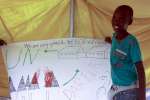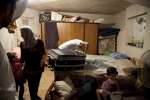- Text size
 |
|  |
|  |
| 
- Français
A special New Year for Afghan couple in Chile after long separation
News Stories, 30 December 2005

SANTIAGO, Chile, 30 December (UNHCR) – Hassan and Marzia are getting ready to spend a very special New Year's Eve – their first together after a ten-year separation. For this young Afghan couple, reunited in Chile in August, the New Year arrives in the midst of their second honeymoon.
The two got married in Afghanistan when Hassan was 18 and Marzia 14. It was only a few months, however, before Hassan had to flee to Azerbaijan to escape persecution in his homeland. The plan was that the couple would soon meet again, but this was not to be. The situation in Afghanistan worsened, and Hassan lost touch with Marzia and her family.
In Azerbaijan, Hassan continued to experience very serious problems and when he found out through the UN refugee agency that resettlement to Chile was an option he took this opportunity for a new start. He arrived in Santiago in March 2003 with three other Afghans, an Iraqi, and an Iranian refugee.
Hassan never gave up on finding his wife, but often despaired of his chances of tracking her down from South America. He is still moved today when he remembers the first lead he got in Santiago.
"For years I had no news of her, although she too was looking for me," he says. "One day, somebody told me of a family in Pakistan who was looking for a person with my name. It was Marzia's family."
A phone call confirmed what seemed too good to be true. From then on, time seemed to stretch endlessly until they could meet again. While UNHCR carried out the couple's reunification procedure, Hassan used his time doing all he could to settle into Chilean society. He learnt Spanish, which he now speaks fluently, made Chilean friends and worked in a carpet store owned by two other Afghans – one of them a refugee.
Well aware of the changes time might have wrought, Hassan found his enthusiasm mixing with anxiety as the hour of reunion got nearer. On the day of his "bride's" long-awaited arrival, his nerves almost got the better of him. Would she like the rented home they were to live in? Would she adapt to life in such a different society? Would she be happy? A two-hour delay did not help, nor, after finally arriving in Santiago did finding her luggage had been lost.
The first few weeks were difficult and very emotional. Marzia missed her family, cried often and ate little. Yet Hassan's optimism was not misplaced. Marzia soon began adapting to life in Chile. She now regularly attends Spanish classes and is speaking her first sentences in the language. Her story has been covered by a major television channel and she receives a warm welcome wherever she goes. "I still can't believe we're together again," she says. "I feel a little more comfortable every day and am happy to be here."
Like Hassan and Marzia, over 100 refugees have found a new home and a second chance in Chile in the past six years. The earlier arrivals were from the former Yugoslavia, Iraq, Afghanistan, then in recent years the majority have come from Colombia. All had first fled to other countries where they continued to experience threats to their safety or encountered serious obstacles to their integration.
The Chilean resettlement programme – the first in South America – started in 1999, when 27 refugees from the Former Yugoslavia arrived in the country following an agreement signed between the government of Chile and UNHCR. This first experiment was not without its share of problems, mainly because the refugees were not sufficiently prepared for the economic challenges they faced in Chile.
The discouragement felt by the refugees in their first few months in Chile also spread to those who had worked to bring them over – the Chilean government, the UN refugee agency and its local partner the Vicaria de Pastoral Social. The lessons that were learnt from this experience have since been integrated into the resettlement programme, the most crucial of them being the importance of providing refugees with as much information as possible about Chile prior to their arrival in the country.
"The programme has grown in different ways," says Marta Gonzalez, who co-ordinates the Vicaria's refugee programme. "Together with the government and UNHCR we have produced a short video showing life in Chile, with first-hand accounts from other refugees already here. This has definitely helped newcomers. It's important for them to understand that it will not be easy, especially in the first few months."
New arrivals now receive orientation on the job market, support in looking for work and, depending on their needs, job training and small loans provided by UNHCR and by the Vicaria. Gonzalez believes that this approach has sped up the entry of refugees into the job market. Eighty percent of resettled refugees are currently working in areas as varied as retail, insurance sales and truck-driving. Some have even set up a cyber-café.
The Chilean government has recently taken several additional steps that further demonstrate its commitment to resettlement – a priority under the Mexico Plan of Action agreed last year between Latin American countries and UNHCR. Amongst these steps was the creation in April of a section on asylum and resettlement at the Interior ministry, headed by Gabriela Saavedra.
Saavedra explains that the resettlement programme is a tangible outcome of Chile's commitment to expanding its responsibilities towards refugees beyond the 1951 Convention, which it ratified in 1972.
"Refugees who could not rebuild their lives in their first place of asylum can now live in peace in our country," she says. "They have access to identification documents and to a visa that allows them to apply for citizenship. Just like Chileans, they can look for work and for a place to live, and they can send their children to school."
The government has just approved the resettlement of a new group of 18 Colombian refugees, who are due to arrive in Chile at the beginning of 2006. In the meantime, Hassan and Marzia will be celebrating the New Year in their adopted country, looking forward to the future with confidence.
By Fabiola Aburto in Santiago, Chile
and Nazli Zaki in Buenos Aires, Argentina









































